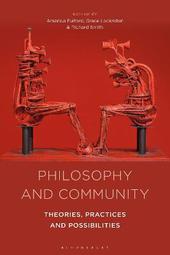
|
Philosophy and Community: Theories, Practices and Possibilities
Hardback
Main Details
| Title |
Philosophy and Community: Theories, Practices and Possibilities
|
| Authors and Contributors |
Edited by Amanda Fulford
|
|
Edited by Grace Lockrobin
|
|
Edited by Richard Smith
|
| Physical Properties |
| Format:Hardback | | Pages:280 | | Dimensions(mm): Height 234,Width 156 |
|
| Category/Genre | Social and political philosophy |
|---|
| ISBN/Barcode |
9781350073401
|
| Classifications | Dewey:172 |
|---|
| Audience | | Professional & Vocational | |
|---|
|
Publishing Details |
| Publisher |
Bloomsbury Publishing PLC
|
| Imprint |
Bloomsbury Academic
|
| Publication Date |
9 January 2020 |
| Publication Country |
United Kingdom
|
Description
'Why should we care about philosophy?' Public philosophy, or 'doing philosophy' in the community, is an important and growing trend - revealed not only by the phenomenon of the Parisian philosophy cafe, but also the contemporary rise of multiple grassroots projects, for example the Philosophy in Pubs movement. This book is the first to offer academic examination of the theoretical contributions and practical applications of community philosophy. Bringing together voices from diverse contexts and subject areas, from activism and political action to religious environments, arts organisations and museums to maximum security prisons, this collection asks key questions about the point of making philosophy available for everyone: 'How do you "do philosophy" with the public?'; 'Is philosophy in the community the same as academic philosophy?'; 'Why is community philosophy important?' Including contributions from practitioners and researchers from professional philosophy, education, healthcare, and community philosophy, this collection offers perspectives on a growing area of study. It offers a timely and critical introduction to, and analysis of, what philosophy can be when grounded in socially-engaged activities.
Author Biography
Amanda Fulford is Head of the Department of Professional Learning and Professor of Philosophy of Education at Edge Hill University, UK. She is the co-author of Philosophy and Theory in Educational Research: Writing in the Margin (2016), and has published in leading journals such as Journal of Philosophy of Education; Ethics and Education; Educational Theory, and Studies in Philosophy and Education. Grace Lockrobin is a Teaching Fellow at Leeds University, UK where her research interests are philosophy of education, moral education, normative ethics, applied ethics, aesthetics, and philosophy of mind and philosophy of action in relation to moral education. She is also Founder and Managing Director of Thinking Space, an education company dedicated to the business of bringing people into philosophical conversation with one another. Richard Smith is Professor in the School of Education at Durham University, UK. In particular, he researches the educational importance of not knowing, the moral psychology of self-belief, and also virtue epistemology. He was the Founding Editor of the journal Ethics and Education. He is Associate Editor of the Journal of Philosophy of Education.
ReviewsThis work is chicken soup for the souls of those who ardently believe in the public significance of philosophical discussion and it is an excellent introduction to public philosophy for the uninitiated. Its chapters are as insightful and exciting as the book as a whole is comprehensive. It will be of great interest to anyone with an appetite for the practices of philosophy beyond the lecture hall. * Joshua Forstenzer, Faculty Fellow in the Social Sciences, Lecturer in Philosophy, and Co-Director of the Centre for Engaged Philosophy, University of Sheffield, U.K. * Philosophy and Community makes a powerful case for philosophical analysis, argument and imagination to be practised within communities, rather than simply applied to them. To be effective, public philosophy needs to be properly understood, and by rigorously examining both theory and practice, this important work helps unlock the rich potential of philosophy to enhance communal flourishing. * Angie Hobbs, Professor of the Public Understanding of Philosophy, University of Sheffield, U.K *
|